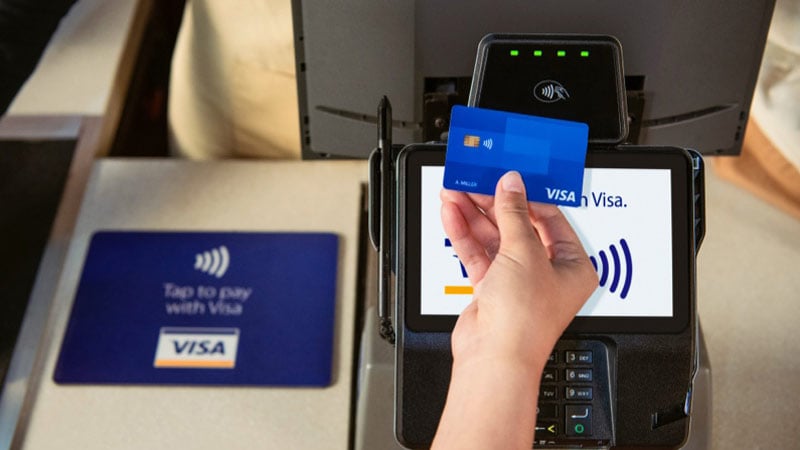When Visa (V +0.34%) reported its 2019 first-quarter earnings three months ago, there were reasons for concern, most notably a significant slowdown in cross-border payment volume growth. This quarter, investors were watching closely to see if the issue was a temporary setback or a sign that something was amiss at the payments network company. This was a new feeling for investors as, since Visa went public in 2008, its returns have topped 1,000%, more than nine times the S&P 500 index's returns over that same period.
The headline numbers certainly appeared fine, if a tad lower than Visa investors are used to. Net revenue rose to $5.5 billion, an 8% increase year over year, while earnings per share (EPS) grew to $1.31, a 17% increase over last year's second-quarter results. This growth was driven by an 8% increase in payments volume to $2.1 trillion and a 9% increase in the number of transactions to 47.4 billion. EPS also got an extra boost by $2 billion of share repurchases made in the quarter. Notably, the revenue growth was the slowest it's been for Visa since its 2016 third quarter, though management did note that currency volatility played a larger factor than normal.
| Visa Metrics | Q2 2019 | Q2 2018 | Change (YOY) |
|---|---|---|---|
| Revenue | $5.49 billion | $5.07 billion | 8% |
| EPS | $1.31 | $1.11 | 17% |
| Payments volume | $2.1 trillion | 2.02 trillion | 4% |
| International transaction revenue | $1.80 billion | $1.75 billion | 3% |
Data source: Visa. YOY = year over year.
While it's premature to say that the cross-border problem is completely resolved, Visa's second-quarter results went a long way to ease investors' concerns. Let's take a closer look at what's been ailing Visa in this crucial area and what the company is doing to fix the problem.

Visa's cross-border payment volume increased only 4% year over year in the second quarter. Image source: Getty Images.
Visa's cross-border woes
As defined by Visa's annual 10-K filing, cross-border transactions occur when a purchase is made with a merchant in a different country than where the Visa card was issued. While Visa doesn't break out its cross-border numbers specifically, the 10-K filing does state, "International cross-border transaction revenues represent a significant part of our revenue and are an important part of our growth strategy." Cross-border revenue is accounted for in Visa's international transaction revenue along with Visa's currency conversion activities.
In Q2, Visa's international transaction revenue rose a meager 3% to $1.8 billion, good for almost 33% of the quarter's total revenue. Weighing in on the slow international transaction revenue growth, Visa CFO Vasant Prabhu said, "Significant headwinds from exchange rates and currency volatility were partially offset by our fiscal year '18 pricing actions and favorable mix, i.e., slower growth in intra-EU volumes." Management said that cross-border volume rose 4%, but didn't give a specific number. This comes after last quarter's 7% cross-border volume growth, which was already noticeably slow.
The good news
Visa management acknowledged that slow cross-border volume growth is a concern and noted that volume "improved moderately" as the quarter progressed. Executives also seem to be taking steps that might not alter cross-border numbers in the near term, but could dramatically improve numbers over the long term. While Visa couldn't comment on this during its conference call due to pending regulatory approval, it's notable that the company outbid rival Mastercard (MA +0.32%) this quarter to acquire Earthport, a business specializing in cross-border payments.
This wasn't the only deal that Visa worked on this quarter to improve its cross-border volumes. During the conference call, Visa announced new deals with Remitly, EMQ, and Sabre (SABR 3.63%). Remitly is an international remittance company that digitally transfers more than $6 billion in annual volume across regions such as Africa, Asia, Central Europe, and South America. Visa CEO Al Kelly said, "Remitly and Visa plan to provide customers with more optionality through the ability to seamlessly send cross-border money transfers to recipients with the Visa credential."
EMQ is a cross-border network that sends digital remittance payments across the Asia-Pacific region. Both deals should help improve Visa's cross-border volumes.
Finally, Visa will work with Sabre, a technology provider for global travel companies, "to enable virtual card payments in [its] B2B travel platform."
A slowing growth story, but no time to panic
Visa's tepid growth in international transaction revenue is a problem, but it hardly seems unfixable. The company seems to be taking action to fix it. The Earthport acquisition is particularly encouraging, as it showed a willingness to outspend Mastercard, which has been much more active recently in the acquisitions arena.
It's also important to not lose sight of the forest for the trees. Visa's massive scale -- 3.4 billion cards issued across the globe -- and business model, collecting small slices of revenue every time one of those cards is used, allowed it to achieve an operating margin of 66% this quarter. Few companies across the investment universe can boast such numbers.
Visa is still an attractive investment, with an enviable business model and a wide economic moat. There are problems, but the company seems to be focused on correcting them. Though the stock price might be volatile in short term, over the long term I believe Visa's moves to correct its cross-border volume growth and its superior business model will continue to reward investors with market-beating returns.








